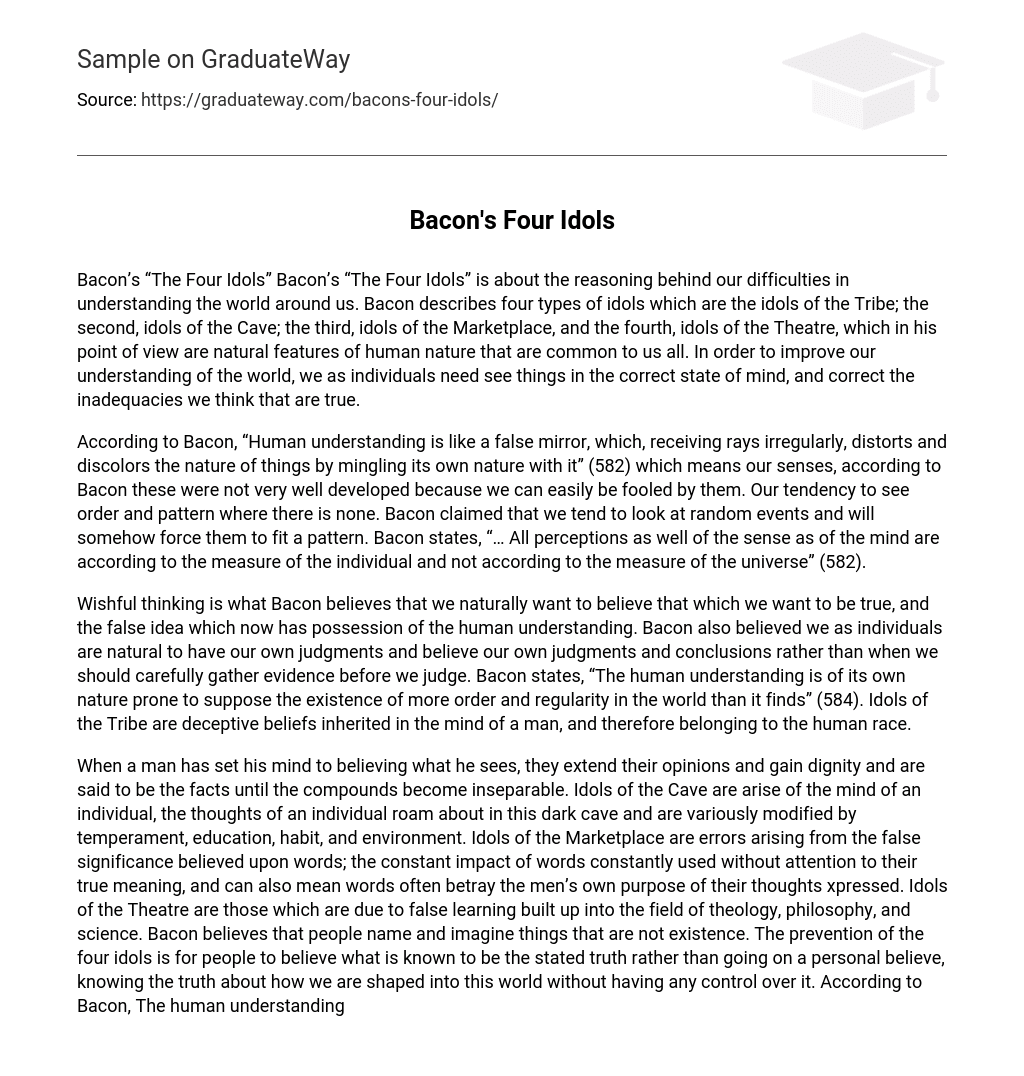Bacon’s “The Four Idols” discusses the challenges we face in comprehending the world. Bacon classifies these challenges into four types: idols of the Tribe, idols of the Cave, idols of the Marketplace, and idols of the Theatre. According to Bacon, these idols are inherent aspects of human nature that affect everyone. To enhance our understanding of the world, it is necessary for individuals to adopt a proper mindset and rectify any false notions we may hold.
Bacon argues that human understanding is like a distorted and discolored mirror, as it receives rays irregularly and mixes its own nature with the nature of things (582). This means that our senses, according to Bacon, are not well-developed and can easily deceive us. We have a tendency to perceive order and pattern even where none exist. Bacon suggests that we often try to fit random events into a pattern. He states, “All perceptions of both the senses and the mind are subjective and not objective” (582).
Bacon suggests that wishful thinking is ingrained in us, leading us to believe what we want to be true, even if it’s false. He also argues that we often trust our own judgments without thoroughly examining the evidence. Bacon believes that humans tend to assume there is more order and regularity in the world than there actually is. These misleading beliefs, which he calls “idols of the Tribe,” are deeply rooted in our minds and passed down through generations.
According to Bacon, when a person firmly believes in what they see, their opinions expand and gain credibility, being referred to as facts until they become inseparable compounds. The Idols of the Cave represent the individual’s thoughts that wander in a dark cave, being influenced by factors like temperament, education, habit, and environment. The Idols of the Marketplace occur due to the false importance given to words, as they are constantly used but often without considering their true meaning. These idols can also reveal the hidden intentions behind people’s expressions. The Idols of the Theatre emerge from mistaken knowledge constructed in fields such as theology, philosophy, and science. Bacon argues that individuals label and imagine things that do not actually exist. To prevent these four idols from influencing our thinking, it is crucial for people to rely on known truths rather than personal beliefs and recognize the truth about how we are shaped by external forces beyond our control. Bacon suggests that human understanding is primarily driven by things that simultaneously and abruptly impress and enter the mind, filling the imagination. As a result, it projects these qualities onto other things, even though it may not comprehend how they are similar to the few objects surrounding it (Bacon 585).The essay is organized to illustrate how idols are perceived depending on a person’s upbringing and location. These idols play a significant role in shaping our characteristics and personalities.
The Idols of Cave have a profound influence on me as they have shaped my beliefs since my childhood. These beliefs, although not always accurate, are still cherished because they are my own personal perspectives. The Idols of Cave exemplify external forces in our world that shape us, such as religion and the limitations imposed by schools on what they can teach and what can be published in textbooks.
The concept of the Idols of Tribe signifies the deceptive notions inherent in human nature. Specifically, it suggests that our daily predicaments arise because of our humanity. It is an intrinsic human quality to perceive more order in the world than truly exists, unquestioningly accept things as they are, and relentlessly pursue the truth behind a subject. As humans, we have a tendency to believe what aligns with our desires, even if there is evidence contradicting an opposing theory.
Works Cited:
Bacon, Frances. “The Four Idols.” A World of Ideas. Ed. Lee Jacobus. 8th e. Boston: Bedford, 2010. Print.





